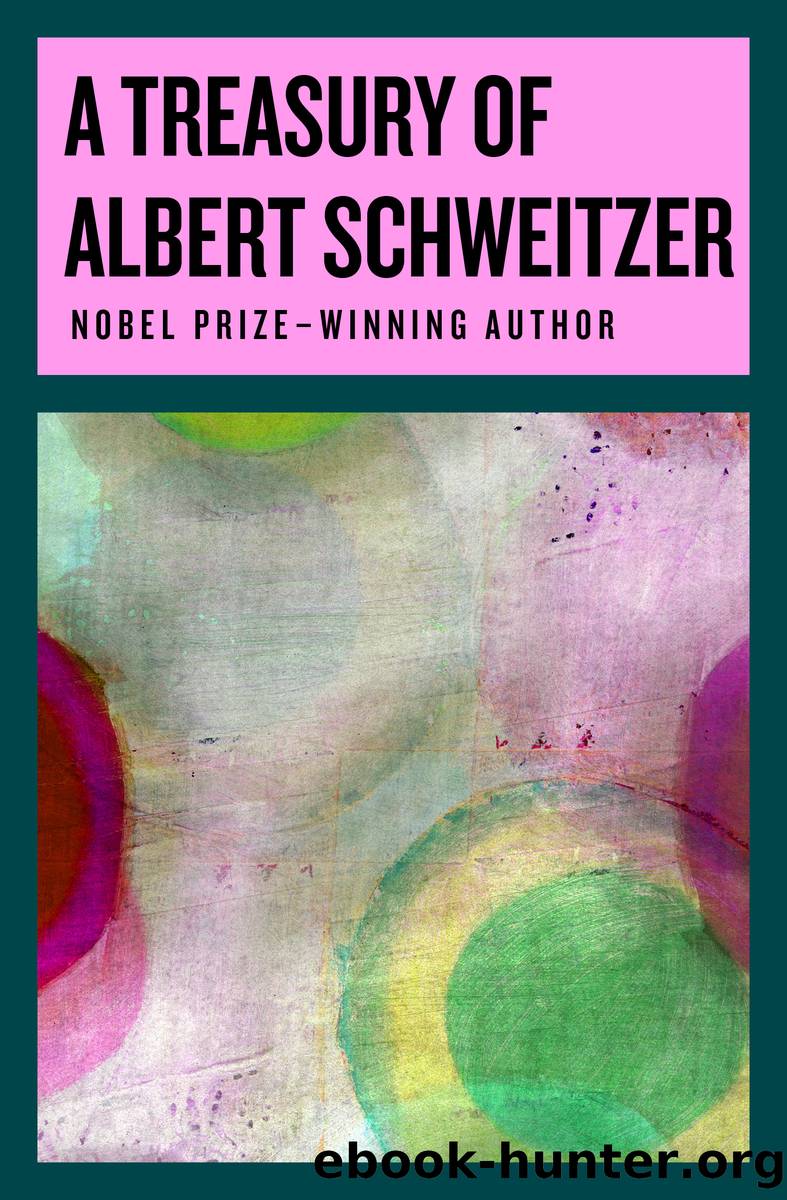A Treasury of Albert Schweitzer by Albert Schweitzer

Author:Albert Schweitzer
Language: eng
Format: epub
ISBN: 9781497675759
Publisher: Philosophical Library/Open Road
Johann Sebastian Bach
The peculiar thing about Bach is that he did not try to gain recognition for his greatest works and he did not ask the world to become acquainted with them. Hence the spirit of consecration which surrounds his works. In his cantatas, we sense a kind of virginal charm which we do not meet in other art-works. The gray volumes of the old Bach Society speak a moving language. They tell us of something that will not be lost, because it is true and great and was created not in order to gain recognition, but because it had to be created.
Bachâs cantatas and passions are not merely the offspring of the Muse. They are also the children of leisure,* in the honorable and profound sense which this term had in times gone by when it signified the hours of life which a man used for himself and himself alone.
Bach was not aware of the uniqueness and greatness of his work.⦠He stands perhaps highest among creative artists. His creative energies expressed themselves without self-consciousness, as do those in nature. They are, therefore, as elemental and enriching as the latter. [96]
The masterâs artistic activity and personality are rooted in his piety. If he is to be understood at all, it must be from this perspective. For him, art was religion. It had no concern with the world and success in worldly affairs. It was an end in itself. According to Bach, religion is included in the definition of art in general. All great art, even if it is called secular, is really religious from his point of view. For him the tones do not fade awayâthey rise as an ineffable praise to God. [97]
In his inner being, Bach belongs to the history of German mysticism. [98]
Viewed from without, Bachâs life seems a scene of conflict and bitterness. In reality, it was, however, peaceful and serene. [99]
As death neared, he dictated to Altnikol (who became his son-in-law in 1749) a chorale fantasia on the melody âWenn wir in höchsten Nöten sein,â and told him to head it with the opening of the hymn âVor deinen Thron tret ich allhier,â which is sung to the same melody. In the manuscript, we can see all the pauses the sick man had to make. The drying ink is more watery from day to day. The notes written at twilight, with the windows curtained, are scarcely readable.
With the veil of death descending, Bach wrote this piece in a dark room. It is unique among his creations. No description can do justice to the perfection of its contrapuntal art. Each segment of the melody is presented in a fugue, in which the inversion of the theme figures each time as the counter-theme. The flow is so natural that after the second line we are not conscious of the art but are completely caught up in the spirit which speaks through these G major harmonies. The storms and confusions of the world no longer penetrated the curtained windows.
Download
This site does not store any files on its server. We only index and link to content provided by other sites. Please contact the content providers to delete copyright contents if any and email us, we'll remove relevant links or contents immediately.
The remains of the day by Kazuo Ishiguro(8949)
Tools of Titans by Timothy Ferriss(8347)
Giovanni's Room by James Baldwin(7301)
The Black Swan by Nassim Nicholas Taleb(7087)
Inner Engineering: A Yogi's Guide to Joy by Sadhguru(6776)
The Way of Zen by Alan W. Watts(6578)
Asking the Right Questions: A Guide to Critical Thinking by M. Neil Browne & Stuart M. Keeley(5741)
The Power of Now: A Guide to Spiritual Enlightenment by Eckhart Tolle(5725)
The Six Wives Of Henry VIII (WOMEN IN HISTORY) by Fraser Antonia(5486)
Astrophysics for People in a Hurry by Neil DeGrasse Tyson(5169)
Housekeeping by Marilynne Robinson(4420)
12 Rules for Life by Jordan B. Peterson(4292)
Double Down (Diary of a Wimpy Kid Book 11) by Jeff Kinney(4252)
The Ethical Slut by Janet W. Hardy(4232)
Skin in the Game by Nassim Nicholas Taleb(4223)
Ikigai by Héctor García & Francesc Miralles(4219)
The Art of Happiness by The Dalai Lama(4116)
Skin in the Game: Hidden Asymmetries in Daily Life by Nassim Nicholas Taleb(3973)
Walking by Henry David Thoreau(3939)
